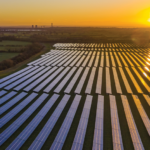
Electricity consumption flexibility key to decarbonisation
9th October 2023
Embarking on a transformative journey towards sustainable heating solutions
6th October 2023Storage research key to reliability

Energy security and climate action must be delivered in parallel to achieve a reliable and affordable future power system, writes Paul Deane, senior lecturer in clean energy futures at University College Cork.
The twin challenge of ‘keeping the lights on’ and ‘keeping emissions down’ requires us to understand both the benefits and risk of a fully weather-driven power system.
Ireland’s power sector has climate targets that limit the cumulative amount of greenhouse gas pollution that can be released across the period 2021 to 2030 to 60 MtCO2eq.
In 2021 and 2022, the sector released approximately 20 million tonnes and recent EPA projections estimate that even with reaching an 82 per cent renewable electricity target in 2030, the sector will release 73 million tonnes, missing its legislated target by 13 MtCO2eq.
We know that increasing market-ready renewables is the best way to reduce greenhouse gas pollution in Ireland because it reduces the use of fossil fuel power plants, but it does not replace the need for plants, which will be required into the 2030s.
This is because, while climate policy is based on averages, power system security is influenced by extremes, and extremes in weather will have a profound impact on the future power system in Ireland.
Over the next decade, being able to operate the Irish power system during times with 100 per cent renewable generation is key to reducing greenhouse gas pollution. Beyond that, being able to operate the system at times with close to 0 per cent of renewable generation is essential for reliability.
One such weather event that will test the reliability of the power system is a so-called ‘Dunkelflaute’ event, where extended periods of low wind speed can persist for up to two weeks.
These events occur already. For example, April to September 2021 was the least windy period for most of the UK and parts of Ireland in the last 60 years, but we have sufficient conventional capacity to deal with them today.
One way to deal with such events in countries like Ireland, which has reduced geographical diversity for interconnection, is to have both seasonal (GWh) and strategic (TWh) clean energy storage.
Seasonal energy storage acts to deliver energy ‘just in time’, whereas strategic storage is ‘just in case’.
This should be a research priority for Ireland over this decade. A reliable and secure electricity supply comes from spare capacity and storage infrastructure that acts as an insurance policy against risky events.
